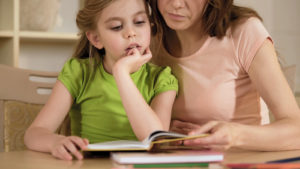School is done for the day. You and child settle in for some family time together. As the play begins, the energy levels start to increase. Running through the rooms. Jumping off of the furniture. Elaborate story lines and game play. It’s all fun and games, until it’s time to stop. The arguing starts. The complaining starts. It might even get physical. What was fun turns into frustration. Tempers flare on all sides.
 No parent or child enjoys this experience.
No parent or child enjoys this experience.
Children feel misunderstood. They don’t understand why people seem to suddenly become frustrated and yell at them.
Parents feel helpless in managing their children and unsure how to get through to them.
There is hope
An approach known as Positive Parenting has helped many families to achieve greater harmony within their families, and this approach may be especially important for parents raising a child with ADHD.
When parents learn to connect with their children in a peaceful and calm manner, it can lead to biological changes within the child’s brain that make it easier for that child to regulate their emotions and behavior.
Researchers have found that family relations among preschool children with ADHD and their parents improve significantly with positive parenting training.
As relationships improved, children displayed reduced physiological arousal and better improve impulse control.
ADHD is challenging, but there are strategies to help both you and your child. Consider these ideas that will help you to create a calmer and happier home life for you and your child.
Encouraging Positive Behavior:
Preventing the behavior is always more effective than trying to stop the behavior.
Create conditions that make it easier for your child to use their strengths and follow house rules.
 Understanding ADHD. Your child may struggle with listening attentively, following directions or planning ahead. But, they may also be highly creative, energetic and very loving.
Understanding ADHD. Your child may struggle with listening attentively, following directions or planning ahead. But, they may also be highly creative, energetic and very loving.- One-on-one time goes a really long way. When children feel loved, secure and connected, they are more likely to listen, follow directions and less likely to act out. Try and schedule 10-15 minutes once or twice a day (preferably twice a day) to have some special time with your child. Do something pleasant together, preferably something of your child’s choosing.
- Reward your child. Offer your child an extra incentive to comply with your expectations. Offer praise or small gifts when they complete their homework and cooperate with their siblings. If they have trouble waiting a week or more to get their prize, let them earn points throughout the day.
- Give your child detailed instructions. Instead of asking them to clean their room, ask them to pick their toys up off the floor and put their clothes in a laundry hamper.
- Use visuals and sounds. Many children with ADHD understand images and sounds better than words. Clarify your instructions with other cues. Set a timer that will buzz when homework time is up. Hang a poster in the bathroom with pictures of a child brushing their teeth and putting on pajamas.
Be Consistent With Consequences
Of course, there will sometimes be lapses. Be prepared to discipline in a way that works better than nagging or criticizing.
- Focus on learning. When your child makes a mistake, show them what they need to do in order to succeed the next time. Teach don’t punish.
- Limit time outs. Sitting still and sitting by themselves, can be extremely difficult, if not impossible for children with ADHD. If you use time outs, keep them very brief. Perhaps consider a time-in instead – sit with your child or go for a quiet walk together.
- One thing at a time. Discuss only one thing at a time. Too many topics, instructions or information can be overwhelming. Give your child a chance to fix one situation before you tackle the next.
- Stay calm. Children with ADHD may seem obvious to other people’s moods or feelings, but they may actually be even more sensitive than the average child. Try to remain calm when your child is impulsive or forgetful, you’ll be in a better position to work together towards peaceful and helpful solutions.
Parenting a child with ADHD is similar to parenting any child. But, it requires more effort and patience. You and your child can have a loving relationship if you believe in their abilities and understand their needs. Stay positive and reach out for help when you need it.

Recent Comments